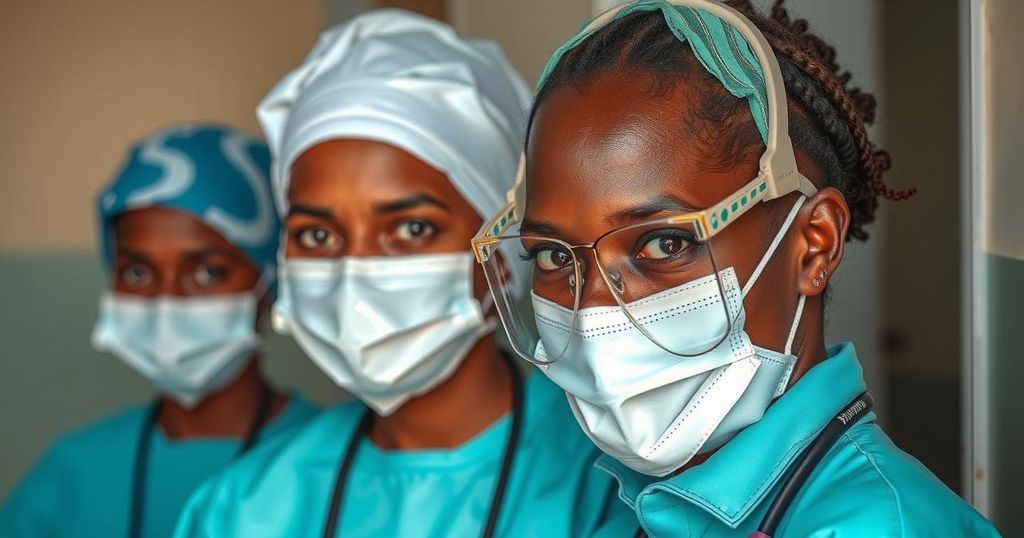Sudan’s healthcare system has dramatically deteriorated due to ongoing conflict, with many hospitals damaged and health workers killed. Doctors like Mohamed Moussa continue their work despite life-threatening conditions, treating victims of violence and starvation. The humanitarian crisis, marked by widespread hunger and healthcare disruptions, demands immediate international support.
Sudan’s healthcare system is in dire straits as the ongoing conflict between army chief Abdel Fattah al-Burhan and former deputy Mohamed Hamdan Daglo escalates. The country’s doctors, exemplified by Dr. Mohamed Moussa from Al-Nao hospital in Omdurman, continue to provide care amidst the cacophony of gunfire and shelling. This war, which has continued unabated since April 2023, has resulted in catastrophic consequences including the deaths of tens of thousands and the displacement of 12 million people, as per the International Rescue Committee.
Inside the overwhelmed wards of Al-Nao hospital, medical staff are confronted with a staggering array of traumatic injuries, including serious gunshot wounds and severe burns. The shelling has taken a toll even on healthcare facilities, with reports from Doctors Without Borders revealing repeated bombardments of Al-Nao and other hospitals. Nearly half of the hospitals in Khartoum state have sustained significant damage during the conflict, according to analyses conducted by Yale University’s Humanitarian Research Lab.
The World Health Organization has recorded 119 verified attacks on healthcare facilities across Sudan. “There is a complete disregard for civilian protection,” asserts Kyle McNally, humanitarian affairs advisor for Doctors Without Borders, emphasizing the depth of violence faced by healthcare workers. Furthermore, the national doctors’ union estimates that up to 90 percent of medical facilities in conflict zones have shuttered, depriving millions of essential healthcare.
The conflict has also led to the tragic targeting of healthcare personnel, with 78 medical workers killed since the war began. Sayed Mohamed Abdullah of the doctors’ union explained that both warring factions often view healthcare staff as collaborators and thereby target them. Reports have confirmed that hospitals are being raided and bombarded indiscriminately, with devastating consequences for the wounded and those seeking care.
In addition to casualties of war, the doctors are facing a looming humanitarian crisis defined by mass starvation. One pediatric hospital has reported treating up to 40 malnourished children daily, with shortages of essential medicines leading to preventable deaths. The United Nations has warned that nearly half the population, totaling approximately 26 million individuals, is facing acute hunger.
Adnan Hezam, spokesperson for the International Committee of the Red Cross, has called for immediate support for medical facilities, warning of a rapid decline in services if assistance is not provided. Amid these overwhelming challenges, Dr. Moussa reflects on the unbearable circumstances saying, “But we cannot stop. We owe it to the people who depend on us.”
The relentless courage exhibited by Sudanese doctors amidst this unfathomable crisis highlights their commitment to their patients, even as they face life-threatening circumstances.
The ongoing conflict in Sudan has escalated sharply since April 2023, primarily involving two prominent military leaders—army chief Abdel Fattah al-Burhan and his former deputy Mohamed Hamdan Daglo of the Rapid Support Forces. This war has wreaked havoc on the country’s healthcare infrastructure, leading to mass casualties and widespread displacement, marking the situation as one of the most severe humanitarian crises in recent history. As the violence continues, doctors and healthcare workers face violent assaults, threats, and a lack of resources, exacerbating what was an already fragile medical system.
In conclusion, the healthcare crisis in Sudan profoundly illustrates the devastating impact of ongoing warfare on medical facilities and their ability to provide care. Reports reveal significant destruction of hospitals and tragic losses among healthcare workers. The international community’s response will be crucial in determining the future of Sudan’s healthcare infrastructure and the well-being of its citizens as humanitarian needs continue to surge.
Original Source: www.barrons.com






